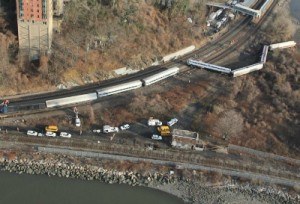Federal safety officials say a technology upgrade they’ve been recommending for years would probably have prevented the Dec. 1 train derailment that killed four people in New York.
The National Transportation Safety Board said a tool called positive train control would have required the engineer to slow the train to an appropriate speed. If he had failed to do so, the technology would have stopped the train, “likely preventing the derailment,” the board said.
Engineer William Rockefeller’s lawyer has said Rockefeller may have experienced a momentary loss of awareness at the controls. The NTSB said last week that the train was at 82 mph as it headed into a curve with a speed limit of 30 mph.

Positive train control, which includes wireless monitoring of a train’s location and braking, can stop a train that’s speeding or otherwise not being operated correctly. Railroads face a congressional deadline to install such systems by December 2015, but some, including Metro-North, are seeking extensions.
NTSB officials said last week that it was possible positive train control would have stopped the train. In an update issued late Monday, the agency said it had completed its mechanical inspection of the train and found “no anomalies.” It said the dead-man switch, a foot pedal on the floor of the engineer’s cab that must be depressed to keep the train moving, was working.
As a result, it said, “The NTSB believes that if positive train control technology was installed on this line and train, it would have required the engineer to slow the train to an appropriate speed or stop the train in the event the engineer did not do so, likely preventing the derailment.”
A call to the engineer’s lawyer was not immediately returned.
The NTSB’s update also said the engineer may have failed to dim his headlight when another train passed him several minutes before the accident.
The agency said the engineer of the passing train reported that the headlight was on high and was not dimmed as required by Metro-North when the trains passed at 7:11 a.m., about nine minutes before the accident near a station in the Bronx.
The safety board said it has completed interviewing crew members from the train but is still talking to passengers.
The agency said it would be leaving New York this week and would return as needed.
Was this article valuable?
Here are more articles you may enjoy.

 Vintage Ferrari Owners’ Favorite Mechanic Charged With Theft, Fraud
Vintage Ferrari Owners’ Favorite Mechanic Charged With Theft, Fraud  California Chiropractor Sentenced to 54 Years for $150M Workers’ Comp Scheme
California Chiropractor Sentenced to 54 Years for $150M Workers’ Comp Scheme  Justice Department Preparing Ticketmaster Antitrust Lawsuit
Justice Department Preparing Ticketmaster Antitrust Lawsuit  Supreme Court Allows More Transport Workers to Bypass Arbitration and Sue Employers
Supreme Court Allows More Transport Workers to Bypass Arbitration and Sue Employers 